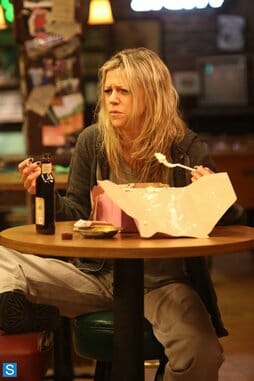It’s Always Sunny in Philadelphia: “The Gang Broke Dee” (Episode 9.01)

Welcome back to television’s funniest display of human cruelty.
There are other shows that celebrate the darker angels of our nature—the unwavering selfishness of Larry David’s alter egos both on Seinfeld and Curb Your Enthusiasm is sort of horrifying, if you can stop laughing long enough to consider it—but there are none quite as nihilistic and amoral as FX’s It’s Always Sunny in Philadelphia. This is a show so committed to the narcissistic, self-serving outlook of its characters that it barely recognizes a world in which love or redemption even exists. The spiritual emptiness is bone-deep; even the dirty, depressing sets look like a place where you’d cut yourself on a sharp edge and catch a bacterial infection.
On the rare occasions when kindness rears its head, it’s either part of a con run by one of the Loathsome Fivesome, or an alien emotion from outside the circle, destined to be mocked or heartlessly used for some small advantage. It doesn’t even matter that Dennis, Charlie, Mac, Frank and Dee are idiots, or that their schemes inevitably fall apart at the seams and leave them in deeper misery than where they started. This isn’t a show where anybody learns a lesson; they only rebound with the implacable, desperate energy of the soulless (comedy zombies!) and callously rip at the next promising thread. Meanwhile, the moral compass spins at random.
So at the dawn of Season Nine, we should have expected a trap when “The Gang Broke Dee” opened on a shot of Sweet Dee in an obvious state of depression, eating a cake recovered from the trash and barely responding to the litany of insults (“you look like—” Mac begins, before Dee finishes the thought: “A bird without tits.”) from the other four. As the title suggests, her role as the group’s punching bag has finally carried her past rage and into a near-suicidal listlessness. The rest of the gang appears worried, and Charlie, Mac and Frank sign her up for an open-mic stand-up comedy night. The goal is to raise her spirits, and they think her depressed state might actually help. “Yeah, you know, you’re right in that sweet spot between suicidal and actually dead…most comedians, they thrive there!” argues Charlie. They add that her new defeatism might even cure her disguisting nervous tic—retching under pressure.
-

-

-

-

-

-

-

-

-

-

-

-

-

-

-

-

-

-

-

-

-

-

-

-

-

-

-

-

-

-

-

-

-

-

-

-

-

-

-

-








































